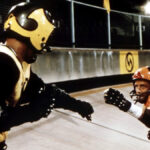The Square: Help!, by David Bax
In its purest form, there’s a basic and easily understood social contract when it comes to helping people. If you’re in public and you’re in trouble, you yell, “Help!” If someone is able, they come to your assistance. But, of course, it’s not that simple. In addition to being able, someone has to be willing. At multiple points in Ruben Östlund’s The Square, people yell out for help, to varying results depending on who is within earshot and how dire the situation appears to them. In another scene, two people have an uncomfortable discussion in a museum next to a noisy art installation. At first, the cacophony is a distraction. Soon, it becomes simple background noise. The parallel Östlund is drawing here is not a subtle one. It’s far too easy for us to become too preoccupied with our own bullshit to pay attention to anything else, be it a nebulous piece of art or a fellow human being in trouble.
Christian (Claes Bang), the curator of the aforementioned art museum, does manage to come to someone’s aid early in The Square. Before you rush to congratulate him, though, know that, first, he’s disproportionately proud of himself for his minor act of decency and, second, that it was all just a set-up for him getting mugged anyway. Any goodwill he may have earned is completely obliterated by his disproportionate response and attempts to get his phone and wallet back. Over the next two hours, the repercussions of his actions upend the lives of numerous people, especially (and karmically) his own.
As curator, Christian spends a lot of time talking about the social impact and importance of art, especially to reporters like Anne (Elisabeth Moss), and especially now that the museum is about to open a new, interactive installation called The Square, which calls on people to help those right in front of them. Therein lies the irony and hypocrisy that Östlund aims to highlight. People who need help are already right in front of you. What is the use of socially conscious art when it acts as a replacement for actual social conscoiusness? Or is it all about marketing, as evidenced by the museum’s crass but energetic millennial PR team, who will offer any idea that attracts enough eyeballs? Maybe it’s just easier to talk about doing good than to do it, particularly in a modern, sterile museum where big ideas can be so effectively sealed off from their practical applications.
Luckily for the viewer, at least, hypocrisy does make for good comedy. As in Östlund’s Force Majeure, many of the best, most uncomfortable laughs come from the main character’s stubborn adherence to self-centeredness, even in the face of opportunities to behave differently, leading to awkward moments like trying to convince an employee to take on a dangerous task and to outrageous ones like pushing a child down the stairs.
Also as in Force Majeure, Christian and everyone else in The Square is obsessively distracted by technology. This motif extends to the film’s visual style, in which every location, from a stairwell to a gymnasium to a 7-11 is presented with an eye toward striking, Apple-style minimalist design. The joke, of course, is that all of this is ornamentation and does nothing to change the comedy or the tragedy playing out within; Östlund probably feels the same way about our phones. In fact, when information technology does have an effect on Christian–when a video goes viral–it’s the worst possible thing that could happen to him.
None of the themes explored in this review required much close analysis. Unlike the knife’s edge satire of Force Majeure, The Square is a blunt object. But maybe that’s what it takes to point out our world’s quotidian surrealism, especially when we’re all too busy navel-gazing to look up at it.






























